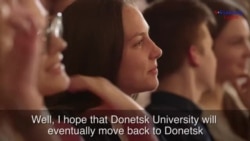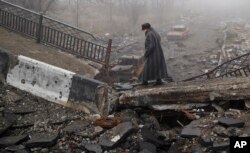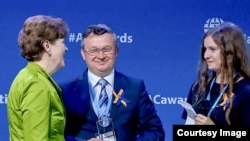Russian-supported rebels seized control of the Ukrainian city of Donetsk two years ago. At the time, Marina Nagornaya was a first-year student at Donetsk National University.
“I remember that I was walking across the city and I saw all these barricades around the buildings where authorities were. I thought, ‘what’s wrong with the people?’”
Donetsk is a city of one million people. It is in eastern Ukraine, about 100 kilometers west of the Russian border. A majority of the people speak Russian. The Donetsk area has close cultural historical ties to Russia.
Marina Nagornaya said life was quiet before the war. Donetsk gained fame as the host city for the 2012 European football championship.
Two years later, Donetsk was a war zone. It was at the center of heavy fighting between Ukrainian government forces and pro-Russian separatists.
Nastya Melchakovskaya was also a student in Donetsk.
“One day you hear the news that somebody wants to attack your city. Your neighbors start to support another country and other political ideas and you feel really strange because yesterday they were your friends and now you’re like, enemies.”
Rebels seize Donetsk National University
In April of 2014, separatists seized government buildings and declared the Donetsk Peoples’ Republic, or DPR. They announced that Donetsk was no longer part of Ukraine.
At Donetsk National University, rebel fighters seized cars and two student dormitories. By late summer, it was no longer safe for students to come to class.
In September, men with guns raised the flag of the DPR at the university. They demanded a pledge of allegiance from the teachers. Professors who did not support the rebels had to leave.
Roman Gryniuk, the university’s Ukrainian rector, was forced out.
“The so-called DPR’s government immediately informed me that I had to gather the academic board members in order to announce the DPR’s decision that our university would be under that terrorist group.”
Gryniuk and some sympathetic professors left Donetsk. But they did not forget about their students. They would teach them anyway — from an empty factory in Vinnytsia, 800 kilometers west of the city.
Donetsk National University became a university in exile.
Starting from nothing in Vinnytsia
Vinnytsia is a mid-sized city in central Ukraine. It is a three-hour train ride west of the capital, Kyiv.
The university administration used space in a Soviet-era jewelry factory in the center of Vinnytsia. They had no computers, desks, or books. They had to leave behind the university’s library and student records.
With help from foreign partners, local officials, and the Ukrainian government, the university set up simple classrooms.
At first, only a few students made the trip west from Donetsk. Nastya Melchakovskaya was one of them. It was her first time living away from home.
“I want to say really thank you to our professors because I’m still here because of them. When I came to Vinnytsia there were only two of us in class from my group. And in Donetsk we have [had] 13 people. But my professor said he’s going to teach us anyway.”
Roman Gryniuk returned to his position as rector.
“In 18 months, we not only resumed the teaching and learning process but we also partially restored the facilities. With the help of our foreign partners we created modern computer and university labs.”
Gryniuk says the biggest problem is finding reasonably priced housing for the growing number of students.
Today about 4,000 students study at the new location. In Donetsk, there were 14,000 students before the war.
Meanwhile in Donetsk
Back in the city of Donetsk, the original university campus continues to operate under the control of the separatists. Both campuses claim to be the only “true” Donetsk National University.
In a speech in front of the main building, history professor Sergey Baryshnikov criticized the students who moved to Vinnytsia.
"The University is where it is supposed to be: in Donetsk. . .To those who are following the steps of Adolf Hitler . . . You will end up where you belong – on the waste dump of history.”
History is at the heart of the information war in the current conflict. Both sides have long lists of historical grievances. For example, separatist supporters often accuse western Ukrainians of supporting the Nazis in World War II. Some pro-Ukraine activists say the rebels are trying to bring back the Soviet Union. One side’s freedom fighter is the other side’s terrorist.
The 2015 school year began on time in Donetsk. Students moved back into the dormitories.
Artem is a student at the Donetsk campus. He recently spoke to a reporter for Russia 24 television.
"I have many relatives in the Russian Federation and in other countries abroad, I have an aunt in Germany and an aunt in Australia but I personally would like to stay in Donetsk after graduation from the University for about 5 years minimum. The war brought people closer and so the love for our country now is even stronger."
The university administration in Donetsk has brought back Russian academic standards. Ukrainian language and history classes have been cut back. The school changed its coat of arms from Ukrainian to Russian. Its website now has a Russian domain address.
Some students are worried about the value of their university diplomas. Diplomas awarded by the DPR are not accepted in Ukraine or in the European Union. This year’s graduates received a second diploma from Southern Federal University in Russia. The students expect these Russian degrees to be accepted internationally.
“A Frozen Conflict”
Back in Vinnytsia, Melchakovskaya and Nagornaya hope their university will move back to Donetsk someday—under Ukrainian control.
But Gryniuk does not think that will happen any time soon.
“I personally think that the university will be here for a long time. The current events show that this will be a frozen conflict.”
The United Nations says that more than 9,000 people have been killed in the conflict in eastern Ukraine since 2014. The level of violence has decreased in recent months. But the battle for young minds continues.
I’m Christopher Jones-Cruise.
Adam Brock reported this story from Vinnytsia, Ukraine. George Grow was the editor.
_____________________________________________________________
Words in This Story
barricade – n. a temporary wall, fence, or similar structure that is built to prevent people from entering an area
terminal – n. a building at an airport where people get on and off airplanes
Donetsk Peoples’ Republic – n. a self-declared republic in eastern Ukraine. Russia is the only major power to recognize it as a state.
dormitory – n. a building that has rooms where students can live
pledge of allegiance – n. a promise of support or loyalty to a country or group.
ideology – n. a set of political ideas
Soviet-era – adj. the period when Ukraine was part of the Soviet Union (1922-1991)
facility – n. something (such as a building or large piece of equipment) that is built for a specific purpose
grievance – n. a feeling of having been treated unfairly
biased – adj. having or showing an unfair tendency to believe that some people or ideas are better than others
coat of arms – n. a special group of pictures that belong to a person, family, or group of people and that are shown on a shield
diploma – n. a document which shows that a person has finished a course of study or has graduated from a school











